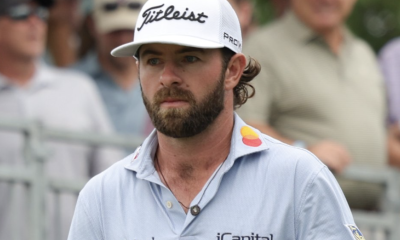Opinion & Analysis
Brooks Koepka’s coach, Claude Harmon III, on BK’s PGA Championship victory, working with the game’s best, and more

Coming fresh off the celebration of Brooks Koepka’s fourth major win, Koepka’s long-time coach, Claude Harmon III chatted with Johnny Wunder as he was just about to hop on a plane back to The Floridian.
Here are the highlights of their conversation.
JW: Claude how you doin’?
CH3: Uh, I’m hungover!
JW: Brooks is walking off the 18th green after another major triumph. What is the first thing you guys said to each other?
CH3: Well, obviously there was a lot of emotion in that moment, but he told me it was the happiest he has ever been on the golf course, and after everything he’s done, that’s a big statement.
For him to put in all the hard work and to fight as hard as he did on a golf course that completely changed on the last day and come out on top makes me extremely grateful to be a part of the team that supports that. I believe he will find out more about himself from getting through the final nine holes than he would if he would have had a parade coming in and won by seven.
JW: That’s a great point. It seems like he is more apt to win even more majors based on that back nine than he would have otherwise.
CH3: I don’t think if you were watching it on TV you could have any appreciation for just how difficult it was. What DJ did yesterday was impossible and having that up ahead applies even more pressure to a leader. Ricky Elliott and BK are looking at the scoreboard and seeing DJ and 3 under and having no idea how that’s even possible. It was that tough.
JW: I think Brooks stubbornness is part of his true greatness. Would you agree?
CH3: His perspective constantly was “I’m still in the lead and someone is going to have to catch me and this golf course is extremely difficult.” Even after all the bogeys on the back side, he still controlled the lead and kept that mantra. The crowd yelling “DJ! DJ!” actually didn’t piss him off, it woke him up and made him want to hit a good drive and show the crowd he was still leading.
JW: How did yesterday compare to Shinnecock?
CH3: At Shinnecock it was an interesting situation because Fleetwood…posted before BK was even off and in that case, Brooks said it was like playing against a ghost. No matter what he does, Tommy isn’t going to make any more mistakes or change in any way. That’s a tough scenario when you are staring at a number that won’t move for 5 1/2 hours.
JW: What do Brooks and DJ have that people can learn from.
CH3: It’s funny because we hear these cliches in sports psychology all the time, but I believe those two are the living embodiment of ONE SHOT AT A TIME. They don’t look back. Ever.
JW: Speaking on DJ. I’m watching the back nine and thinking to myself this guy is playing out of his mind, it was literally a battle of the best.
CH3: We talk about it all the time in golf, what we always want is the two best players in the world going toe to toe. We had that yesterday and I hope as time goes by we can look at this final round as a battle we will be talking about for a long time. Best players in the world on a tough but fair golf course with the ultimate prize on the line. In situations like this when there is this kind of pressure and these stakes you can look at the leaderboard and see the cream rising to the top. Rory, DJ, Jordan all with good rounds on a really tough day.
JW: You met Brooks in 2013, he showed up in his mom’s beat up Explorer and don’t know him at all. What was your first impression?
CH3: I was introduced to him by Pete Uihlein, his old roommate, and at first glance, he had raw talent and a ton of speed, but no plan. At the time he was hitting a draw and was uncomfortable with that. He told me his current coach wanted him to hit draws, and I said well that’s your fault, not your coach’s. It’s the player’s responsibility to manage himself and the information he’s comfortable with. When we worked on him getting into a fade, he started to click and he turned to me and said “it can’t be this easy.” My reply was “it has to be this easy!” At that level, under the gun, it better be easy. [Golf is] tough enough already.
JW: What were his career goals early on?
CH3: Even then, he wanted to be an elite player who won multiple majors. I was coaching Ernie Els at the time who had just won his fourth major and Brooks was on the Challenge Tour. He was committed to getting there but needed guidance, someone with a plan that wasn’t just his golf swing. Obviously, it worked out.
JW: What would you say is the Harmon secret to getting the best players in the world to peak as often as you guys do?
CH3: My dad told me: “What you don’t say is just as important as what you do say.” At the Masters this year Brooks, in practice, was really struggling. Look, it’s Masters week and I’m not going to go in there and start putting thoughts in his head. At that point, if this is a shuttle launch, we are in the cockpit and there is no turning back. My dad always had his guys have a go-to shot that they “knew” they could hit. Brooks calls it his “fairway finder” which is a squeeze off fade with a driver. I told him to hit a couple of those knowing it might spur some confidence. After a few absolutely flushed missiles, his confidence went up and he turned to me and said…”fairway finder all day.” The rest is history.
JW: You coach DJ, Brooks, Jimmy Walker and Rickie. Describe each in one word
JW: DJ
CH3: Natural
JW: Brooks
CH3: Tough MF
JW: Rickie
CH3: Genuine
JW: Jimmy
CH3: Soulful
JW: Thanks old friend
CH3: Talk soon, thanks man.
Opinion & Analysis
The 2 primary challenges golf equipment companies face

As the editor-in-chief of this website and an observer of the GolfWRX forums and other online golf equipment discourse for over a decade, I’m pretty well attuned to the grunts and grumbles of a significant portion of the golf equipment purchasing spectrum. And before you accuse me of lording above all in some digital ivory tower, I’d like to offer that I worked at golf courses (public and private) for years prior to picking up my pen, so I’m well-versed in the non-degenerate golf equipment consumers out there. I touched (green)grass (retail)!
Complaints about the ills of and related to the OEMs usually follow some version of: Product cycles are too short for real innovation, tour equipment isn’t the same as retail (which is largely not true, by the way), too much is invested in marketing and not enough in R&D, top staffer X hasn’t even put the new driver in play, so it’s obviously not superior to the previous generation, prices are too high, and on and on.
Without digging into the merits of any of these claims, which I believe are mostly red herrings, I’d like to bring into view of our rangefinder what I believe to be the two primary difficulties golf equipment companies face.
One: As Terry Koehler, back when he was the CEO of Ben Hogan, told me at the time of the Ft Worth irons launch, if you can’t regularly hit the golf ball in a coin-sized area in the middle of the face, there’s not a ton that iron technology can do for you. Now, this is less true now with respect to irons than when he said it, and is less and less true by degrees as the clubs get larger (utilities, fairways, hybrids, drivers), but there remains a great deal of golf equipment truth in that statement. Think about it — which is to say, in TL;DR fashion, get lessons from a qualified instructor who will teach you about the fundamentals of repeatable impact and how the golf swing works, not just offer band-aid fixes. If you can’t repeatably deliver the golf club to the golf ball in something resembling the manner it was designed for, how can you expect to be getting the most out of the club — put another way, the maximum value from your investment?
Similarly, game improvement equipment can only improve your game if you game it. In other words, get fit for the clubs you ought to be playing rather than filling the bag with the ones you wish you could hit or used to be able to hit. Of course, don’t do this if you don’t care about performance and just want to hit a forged blade while playing off an 18 handicap. That’s absolutely fine. There were plenty of members in clubs back in the day playing Hogan Apex or Mizuno MP-32 irons who had no business doing so from a ballstriking standpoint, but they enjoyed their look, feel, and complementary qualities to their Gatsby hats and cashmere sweaters. Do what brings you a measure of joy in this maddening game.
Now, the second issue. This is not a plea for non-conforming equipment; rather, it is a statement of fact. USGA/R&A limits on every facet of golf equipment are detrimental to golf equipment manufacturers. Sure, you know this, but do you think about it as it applies to almost every element of equipment? A 500cc driver would be inherently more forgiving than a 460cc, as one with a COR measurement in excess of 0.83. 50-inch shafts. Box grooves. And on and on.
Would fewer regulations be objectively bad for the game? Would this erode its soul? Fortunately, that’s beside the point of this exercise, which is merely to point out the facts. The fact, in this case, is that equipment restrictions and regulations are the slaughterbench of an abundance of innovation in the golf equipment space. Is this for the best? Well, now I’ve asked the question twice and might as well give a partial response, I guess my answer to that would be, “It depends on what type of golf you’re playing and who you’re playing it with.”
For my part, I don’t mind embarrassing myself with vintage blades and persimmons chasing after the quasi-spiritual elevation of a well-struck shot, but that’s just me. Plenty of folks don’t give a damn if their grooves are conforming. Plenty of folks think the folks in Liberty Corner ought to add a prison to the museum for such offences. And those are just a few of the considerations for the amateur game — which doesn’t get inside the gallery ropes of the pro game…
Different strokes in the game of golf, in my humble opinion.
Anyway, I believe equipment company engineers are genuinely trying to build better equipment year over year. The marketing departments are trying to find ways to make this equipment appeal to the broadest segment of the golf market possible. All of this against (1) the backdrop of — at least for now — firm product cycles. And golfers who, with their ~15 average handicap (men), for the most part, are not striping the golf ball like Tiger in his prime and seem to have less and less time year over year to practice and improve. (2) Regulations that massively restrict what they’re able to do…
That’s the landscape as I see it and the real headwinds for golf equipment companies. No doubt, there’s more I haven’t considered, but I think the previous is a better — and better faith — point of departure when formulating any serious commentary on the golf equipment world than some of the more cynical and conspiratorial takes I hear.
Agree? Disagree? Think I’m worthy of an Adam Hadwin-esque security guard tackle? Let me know in the comments.
@golfoncbs The infamous Adam Hadwin tackle ? #golf #fyp #canada #pgatour #adamhadwin ? Ghibli-style nostalgic waltz – MaSssuguMusic
Podcasts
Fore Love of Golf: Introducing a new club concept

Episode #16 brings us Cliff McKinney. Cliff is the founder of Old Charlie Golf Club, a new club, and concept, to be built in the Florida panhandle. The model is quite interesting and aims to make great, private golf more affordable. We hope you enjoy the show!
Opinion & Analysis
On Scottie Scheffler wondering ‘What’s the point of winning?’

Last week, I came across a reel from BBC Sport on Instagram featuring Scottie Scheffler speaking to the media ahead of The Open at Royal Portrush. In it, he shared that he often wonders what the point is of wanting to win tournaments so badly — especially when he knows, deep down, that it doesn’t lead to a truly fulfilling life.
View this post on Instagram
“Is it great to be able to win tournaments and to accomplish the things I have in the game of golf? Yeah, it brings tears to my eyes just to think about it because I’ve literally worked my entire life to be good at this sport,” Scheffler said. “To have that kind of sense of accomplishment, I think, is a pretty cool feeling. To get to live out your dreams is very special, but at the end of the day, I’m not out here to inspire the next generation of golfers. I’m not out here to inspire someone to be the best player in the world, because what’s the point?”
Ironically — or perhaps perfectly — he went on to win the claret jug.
That question — what’s the point of winning? — cuts straight to the heart of the human journey.
As someone who’s spent over two decades in the trenches of professional golf, and in deep study of the mental, emotional, and spiritual dimensions of the game, I see Scottie’s inner conflict as a sign of soul evolution in motion.
I came to golf late. I wasn’t a junior standout or college All-American. At 27, I left a steady corporate job to see if I could be on the PGA Tour starting as a 14-handicap, average-length hitter. Over the years, my journey has been defined less by trophies and more by the relentless effort to navigate the deeply inequitable and gated system of professional golf — an effort that ultimately turned inward and helped me evolve as both a golfer and a person.
One perspective that helped me make sense of this inner dissonance around competition and our culture’s tendency to overvalue winning is the idea of soul evolution.
The University of Virginia’s Division of Perceptual Studies has done extensive research on reincarnation, and Netflix’s Surviving Death (Episode 6) explores the topic, too. Whether you take it literally or metaphorically, the idea that we’re on a long arc of growth — from beginner to sage elder — offers a profound perspective.
If you accept the premise literally, then terms like “young soul” and “old soul” start to hold meaning. However, even if we set the word “soul” aside, it’s easy to see that different levels of life experience produce different worldviews.
Newer souls — or people in earlier stages of their development — may be curious and kind but still lack discernment or depth. There is a naivety, and they don’t yet question as deeply, tending to see things in black and white, partly because certainty feels safer than confronting the unknown.
As we gain more experience, we begin to experiment. We test limits. We chase extreme external goals — sometimes at the expense of health, relationships, or inner peace — still operating from hunger, ambition, and the fragility of the ego.
It’s a necessary stage, but often a turbulent and unfulfilling one.
David Duval fell off the map after reaching World No. 1. Bubba Watson had his own “Is this it?” moment with his caddie, Ted Scott, after winning the Masters.
In Aaron Rodgers: Enigma, reflecting on his 2011 Super Bowl win, Rodgers said:
“Now I’ve accomplished the only thing that I really, really wanted to do in my life. Now what? I was like, ‘Did I aim at the wrong thing? Did I spend too much time thinking about stuff that ultimately doesn’t give you true happiness?’”
Jim Carrey once said, “I think everybody should get rich and famous and do everything they ever dreamed of so they can see that it’s not the answer.”
Eventually, though, something shifts.
We begin to see in shades of gray. Winning, dominating, accumulating—these pursuits lose their shine. The rewards feel more fleeting. Living in a constant state of fight-or-flight makes us feel alive, yes, but not happy and joyful.
Compassion begins to replace ambition. Love, presence, and gratitude become more fulfilling than status, profits, or trophies. We crave balance over burnout. Collaboration over competition. Meaning over metrics.
Interestingly, if we zoom out, we can apply this same model to nations and cultures. Countries, like people, have a collective “soul stage” made up of the individuals within them.
Take the United States, for example. I’d place it as a mid-level soul: highly competitive and deeply driven, but still learning emotional maturity. Still uncomfortable with nuance. Still believing that more is always better. Despite its global wins, the U.S. currently ranks just 23rd in happiness (as of 2025). You might liken it to a gifted teenager—bold, eager, and ambitious, but angsty and still figuring out how to live well and in balance. As much as a parent wants to protect their child, sometimes the child has to make their own mistakes to truly grow.
So when Scottie Scheffler wonders what the point of winning is, I don’t see someone losing strength.
I see someone evolving.
He’s beginning to look beyond the leaderboard. Beyond metrics of success that carry a lower vibration. And yet, in a poetic twist, Scheffler did go on to win The Open. But that only reinforces the point: even at the pinnacle, the question remains. And if more of us in the golf and sports world — and in U.S. culture at large — started asking similar questions, we might discover that the more meaningful trophy isn’t about accumulating or beating others at all costs.
It’s about awakening and evolving to something more than winning could ever promise.




















Boss of the moss
May 21, 2019 at 5:25 pm
Best article on here in a while
Honest and informative
More interviews with tour players, coaches, tour van equipment interviews as well, less opinion pieces. Thanks
T-Bone
May 21, 2019 at 2:46 pm
What DJ did on the final day was impossible? There were 7 other 69’s, along with his. And 2 68’s. Yes, Brooks won. But I don’t see how he can feel that good with 4 over in the final round.
Mike Kutilek
May 22, 2019 at 1:16 pm
The 7 other 69’s and the 68’s were all earlier in the day before the wind got crazy. Of the last 12 groups only DJ was par or better.
Borat S
May 21, 2019 at 8:23 am
Brooks is boring yawnnnnnnnnnnn. Like my sister.
Stephen Peltier
May 20, 2019 at 7:29 pm
I was wondering when the Harmons would start getting their due. What do Tiger and Brooks have in common? Harmon.
Benjamin Wright
May 20, 2019 at 6:49 pm
must be nice being given that stable of players from your dad
Michael D Christiansen
May 20, 2019 at 5:53 pm
Tough MF, I love it. Just going to get tougher.